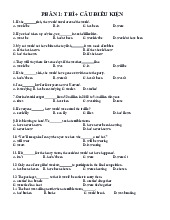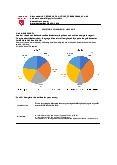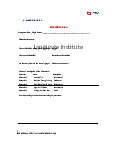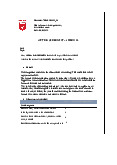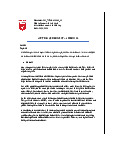



Preview text:
BUỔI 2: WRITING TASK 2 + SPEAKING PART 2 – FEBRUARY 2024 31/01/2024-01/02/2024
There are 3 ways of writing a paragraph
3 types: 1 idea, 2 ideas, and 3 ideas Three ideas:
This is probably the easiest and fastest type of paragraph, so it’s a good ‘weapon’ to have
in a stressful exam situation. Just write 5 sentences: - topic - first idea - second idea - third idea - extend / example Two ideas:
This is probably my favourite type of paragraph structure: it’s still quite easy, but it allows us to
present and extend more fully. Write 5 sentences like this: - topic - first idea - extend / example - second idea - extend / example One idea:
This is perhaps the most difficult type because you need to go deeper into a single idea. Here’s the easiest way to do this: - topic (1 idea) - explain - extend - example - extend the example
Look at example of paragraphs in the essay material. Topic 1
Some people think that it would be better if we had a single legal system throughout the world.
Others say that countries should continue to make their own laws.
Discuss both views and give your own opinion. Topic 2
Some people believe teenagers should focus on all subjects equally, whereas other people think
that they should concentrate on only those subjects that they find interesting and they are best at.
Discuss both these views and give your own opinion. Gợi ý trả lời: Introduction:
The debate over how teenagers should approach their academic studies has been a subject of
discussion for quite some time. On one side of the spectrum, some argue that teenagers should
distribute their attention equally among all subjects, while others believe that teenagers should
concentrate primarily on subjects they find interesting and excel at. In this essay, we will delve
into both perspectives and explore the merits of each, ultimately offering my own viewpoint on this crucial matter. Body:
Balancing All Subjects Equally:
Advocates for this approach argue that teenagers should maintain a balanced approach to their
studies, giving equal importance to all subjects. Here are some reasons supporting this viewpoint:
a. Holistic Knowledge: Learning a wide range of subjects helps teenagers develop a well-
rounded knowledge base. This approach ensures that they are exposed to various disciplines,
which can contribute to their overall personal growth.
b. Future Preparedness: A balanced education equips teenagers with essential skills and
knowledge that they may need in various aspects of their future lives. It ensures that they have a
basic understanding of diverse subjects, which could prove beneficial in unforeseen circumstances.
c. Equal Opportunities: By giving equal attention to all subjects, teenagers are more likely to
perform well across the board. This can open up a broader range of educational and career
opportunities, as they won't be limited by their knowledge in specific areas.
Concentration on Personal Interests and Strengths:
On the other side of the argument, some believe that teenagers should focus primarily on
subjects they find interesting and excel at. Here are the key points supporting this perspective:
a. Passion and Motivation: Concentrating on subjects of personal interest can enhance motivation
and passion for learning. Teenagers are more likely to put in extra effort and time when they are
genuinely enthusiastic about a subject.
b. Specialization: By dedicating more time to subjects where they excel, teenagers can
potentially become specialists in those areas. This specialization can lead to a deeper
understanding and mastery of a particular field.
c. Individualized Learning: Every teenager is unique, and their interests and strengths vary.
Tailoring their education to their preferences allows for a more personalized and enjoyable
learning experience, which can lead to better academic outcomes. My Own Opinion:
Personally, I believe that there should be a balance between these two approaches. While
it is essential for teenagers to have a well-rounded education that covers a variety of subjects,
they should also have the freedom to explore and excel in areas that genuinely interest them.
This approach encourages both breadth and depth of knowledge.
Encouraging teenagers to find their passions and excel in those areas can lead to a more
fulfilling educational experience. However, it is equally important not to neglect other subjects
entirely, as a basic understanding of various disciplines is valuable in an increasingly interconnected world.
Additionally, educators and parents should play a pivotal role in guiding teenagers to
strike this balance. They can help teenagers identify their interests and strengths while ensuring
they do not neglect other important subjects. Conclusion:
The debate over whether teenagers should focus equally on all subjects or concentrate on their
interests and strengths is an ongoing one. Both approaches have their merits, and a balanced
approach that combines elements of both is likely the most beneficial. It is essential to recognize
the individuality of each teenager and provide guidance and support accordingly, ultimately
preparing them for a well-rounded and successful future.
---------------------------------------------------------
LEARN VOCABULARY FROM ESSAY SPEAKING PART 2
HỌC THUỘC – QUAY VIDEO <= 2 PHÚT
NỘP QUA MESSENGER HOẶC ZALO TRẢ BÀI CHO THẦY
BÀI NÓI NÀY CÓ FILE AUDIO, CÁC BẠN CÓ THỂ VÀO LINK TÀI LIỆU CỦA
THÁNG TẢI VỀ NGHE ĐỂ PHÁT ÂM CHO CHÍNH XÁC NHÉ
Describe an activity that made you feel tired You should say When it happened Where it took place What the activity was
And explain why it made you feel tired
I'd like to share an experience that left me feeling utterly exhausted, and it happened during a
volunteering trip to a rural village in Vietnam. This adventure took place a few months ago in a
charming village surrounded by lush greenery and vibrant rice fields. Our mission was to
contribute to the construction of a much-needed school for the local children. However, the work was far from easy.
The village itself was a hidden gem, surrounded by lush greenery and vibrant rice paddies,
offering a stark contrast to the bustling city life I was accustomed to. Under the scorching
Vietnamese sun, we spent our days digging foundations, mixing concrete, and carrying heavy
construction materials. The physical demands of the task, combined with the relentless heat, left me drained and exhausted.
What struck me most was the unwavering determination and camaraderie of the local volunteers
who were accustomed to this challenging labor. Despite my fatigue, witnessing the progress of
the school's construction and the smiles on the faces of the eager local children made it all worthwhile.
In the end, that day in the village was an exhausting yet enriching experience. It reminded me of
the power of collective effort and left me with lasting memories of the beautiful countryside and
the remarkable people I had the privilege to work alongside.
